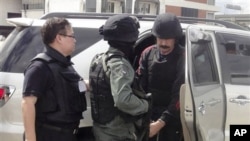Suspected Russian arms dealer Viktor Bout has been extradited from Thailand to the United States to stand trial, a development opposed by Moscow. U.S. officials say the move will not complicate U.S.-Russian relations, despite Russian comments to the contrary.
The United States has long been seeking the extradition of Viktor Bout, an alleged international arms trafficker who was captured in Thailand more than two years ago.
Bout, a former Soviet air force pilot, is accused of selling weapons that have been used in conflicts in Africa, the Middle East and South America. He will face trial in the United States on charges of conspiring to sell weapons to a terrorist organization for use in killing Americans.
Moscow has long opposed Bout's extradition to the United States and called for him to be released and returned to Russia.
U.S. State Department Spokesman P.J. Crowley told reporters Tuesday that he does not believe this development will have an effect on U.S. relations with Russia. He characterized the relationship between the U.S. and Russia as "broad and deep," and guided by mutual national interests.
"We understand that on a number of issues, we agree to disagree sometimes," said Crowley. "We have tensions that crop up periodically, and we work to manage those. I don't expect that this will have any impact on the relationship."
U.S. lawmakers told Thailand in August that its handling of the Bout case had not been fair or transparent, and they warned that his release could harm U.S.-Thai relations.
Speaking to reporters while on a visit to Kenya Tuesday, Russia's Foreign Minister Sergei Lavrov said the extradition is a result of unprecedented political pressure on the Thai court system and government.
Lavrov said Russia's foreign ministry considers the entire situation to be an outrageous injustice and that the ministry will continue to assist Bout.
Crowley said State Department officials are aware of the Russian government's feeling about the extradition. He emphasized that Thailand's decision to extradite Bout was just.
"It is fully consistent with both our bilateral treaty obligations with Thailand and fully consistent with international law," added Crowley.
Also Tuesday, the deputy president of Russia's Duma, Vladimir Zhirinovski, accused the U.S. Central Intelligence Agency of framing Bout. Zhirinovski said the situation will complicate U.S.-Russian relations.
Bout has denied the charges against him, saying he is a legitimate businessman who operated an airfreight company.
But the United Nations has also sanctioned Bout for alleged arms trafficking activity and support of armed conflicts in Africa.
Thai police and U.S. drug agents arrested Bout in Bangkok in March 2008 as part of a sting operation that involved U.S. agents posing as members of the Revolutionary Armed Forces of Colombia (FARC). Bout was allegedly involved in a deal to provide Russian anti-aircraft missiles and other weapons.
Last year, a Thai court rejected a U.S. extradition request on grounds that FARC is not a terrorist group.
The U.S. Department of Justice has said that the facts of the case, Thai law and the terms of the U.S.-Thai bilateral extradition treaty all supported Bout's extradition.
US: Russian Arms Dealer's Extradition Will Not Affect Relations with Moscow
